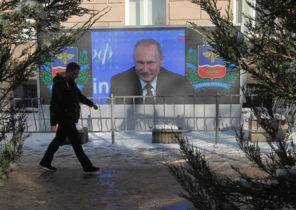Scientists are working to develop vaccines against covid-19, and a small but zealous antivaccination movement is mobilizing to fight her. The campaign put forward extravagant theories and arguments. They falsely claim that a vaccine against coronavirus will use to implant people with microchips, and equally false claim that in Britain died one woman who participated in the vaccine trials. In April, these people were in California to the protests against the isolation, carrying placards with slogans against the vaccine. Last week in YouTube appeared remote today video, which put forward wild conspiracy theories about the pandemic and alleged (unproven) that the vaccine “will kill millions”. This video has garnered over eight million views.
It is unknown how many people will actually refuse to get vaccinated for covid-19, but the overall level of support for vaccines is quite high. However, some researchers, who study the movements against vaccination, saying that they worried about other things. Those messages that are spread by opponents of the vaccine, may undermine efforts to establish collective immunity of the novel coronavirus. Online opposition, speaking against the vaccine very quickly started talking about the pandemic, says physicist Neil Johnson (Neil Johnson) working in the capital’s George Washington University and studying the tactics of the participants in this campaign. “Many of these organizations, only about covid and say,” he says.
Objecting to the vaccine on a small number of members, but their online strategy is amazingly effective and are fraught with alarming consequences, than this week have written a scientific team Johnson. Even before the emergence of the virus SARS-CoV-2, these researchers began to study the views on vaccination contained in social networks such as Facebook. They analyzed more than 1 300 pages, subscribed to by about 85 million users.
May 13, they published their findings, indicating that protivogrippoznyh pages is usually less subscribers than those that support vaccination, but the former are more numerous than the second. In addition, they often give links to other discussions on Facebook such as the pages of parents ‘ associations in schools. And there is the attitude towards vaccination is very controversial.
On the other hand, pages which will explain the benefits of vaccination and provide the scientific arguments in favor of vaccination, United in a community that have nothing to do with the “main battlefield” for the public mood, as expressed by Johnson. During a measles outbreak in 2019 protivogrippoznyh pages on Facebook have more links than the pages of in defense of vaccination, said the team of Johnson. Extrapolation of current trends using a computer simulation indicates that antivaccinationist ten years may occupy a dominant position in the network views on the vaccine.
This work shows that “proponents of vaccination, in fact, stick to their point of view and are talking to each other, not reacting to the arguments and views of those who still doubt,” says Heidi Larson (Larson Heidi), who heads the project “confidence in the vaccine” (Vaccine Confidence Project). Her group from the London school of hygiene and tropical medicine monitors the degree of public confidence in various vaccines.
This problem has gone beyond Facebook. April 1, the team of Johnson published the preliminary results of another study of communications online on the issue covid-19. This work has not yet received peer assessment, but indicates the widening of the linkages when discussing the pandemic between groups of antivaccination in different social networks and other interest groups, including extreme right-wing extremists.
To counter the spread of antivaccinationists, you need to understand not only the form of online maps, but also how it happened, says the President of the global immunization Bruce Gellin (Bruce Gellin), working in Washington at the Institute of vaccines they. Sabin. “We have to understand that in these conversations and in this content (on the topic of anti-vaccination) causes people to listen and to disseminate this information,” he says.
Diverse, stimulating emotions messages
Supporters of vaccination the message is simple: the vaccine works and saves lives. Antivaccination similar interpretations and ideas of many, and they are very intricate. Someone is causing concern for the health of children; someone who advocates for alternative medicine; someone puts forward conspiracy theories about immunization. Such messages about the dangers of vaccines are distributed much more widely and in more online communities than information larger groups of supporters of vaccination. Johnson says his team found similar patterns in earlier studies insurgent networks in conflict zones. There are militants and rebels very often and quite deeply embedded in existing social networks.
Antivaccination usually luring people to their side in an emotional message, given the personal characteristics of recipients. According to Larson, they are not always based on fear (“the Vaccine will kill you”.) Quite often, antivaccination appeal to deep feelings (“You love your children?”). Meanwhile, doctors just trying to cover vaccinations as many people as possible, and that is the feeling that they are trying to improve their statistics. “In relation to doubting people need a very different approach, says Larson. — Advocating for vaccinations organizations do not listen to people’s concerns and issues.”
Gellin notes that the majority of people in favour of vaccination, and agree to make them during a pandemic. However, in the last two decades, the level of vaccination in the world remains unchanged. Larson and Gellin concerned that people have another reason for suspicion about the vaccine from covid-19: this is the speed at which it is developed. “We have very clearly and very openly talk about the development process, says Gellin. Otherwise, when you receive a vaccine, people will start to ask questions about whether or not scientists be cut any corners.”
Will have to think carefully about the content and tone of messages about the vaccine. If the number of infections covid-19 will be reduced, to argue in favor of vaccination will be more difficult, says Larson. “To change people’s attitudes to vaccination will authorities that if you’re caught, you have the right to go to work,” she says.






